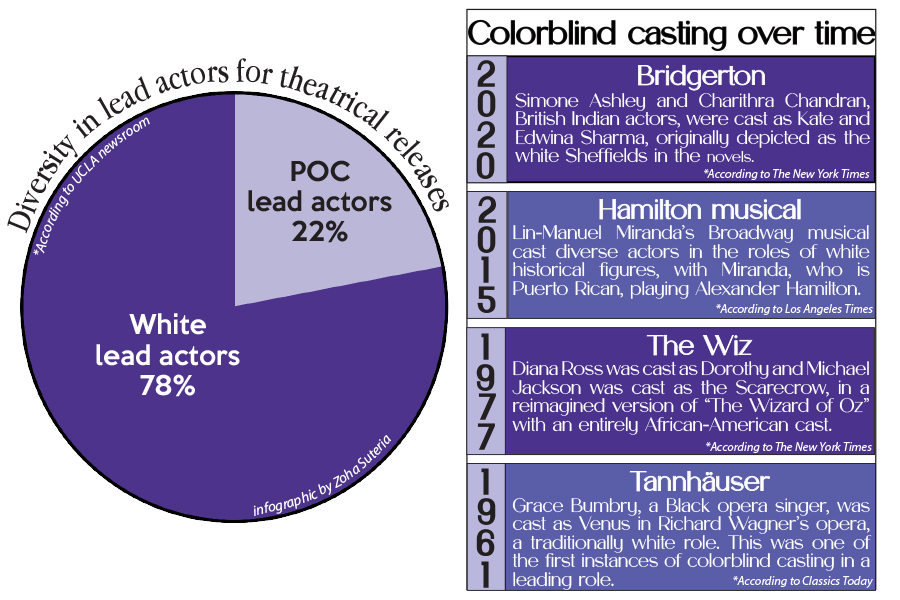Basking in the warm glow of a television, popcorn bowls scatter around the couch as laughter and joy fill the air. On the screen, the familiar tale of The Little Mermaid unfolds in all its animated glory. As you become immersed in the underwater world of Ariel and her adventures, a subtle shift occurs. The animation seamlessly transforms into live-action.
But something else is different.
Ariel’s not the pale, red-hair beauty we’ve grown up with. Instead, she’s portrayed by a Black actress, with her copper locks cascading underwater.
This bold casting choice exemplifies the concept of colorblind casting, the practice of casting without consideration of a person’s skin color, race, ethnicity, and so forth.
White people represented 78 percent of the lead actors in 2022’s top theatrical releases, up from 72.4 percent in 2019, according to the Los Angeles Times. This highlights a concerning trend of decreasing representation in media. Here, embracing colorblind casting is crucial to foster greater diversity and representation across all racial and ethnic backgrounds.
For example, the recent fancast of Avantika Vandanapu, an Indian American actress, as Rapunzel in a live-action Tangled has stirred up some controversy.
Many people were unhappy with the idea of a brown person with dark, curly hair being a princess who is traditionally depicted as white and blonde, according to USA Today. However, Rapunzel’s iconic golden blonde hair is merely a strand in the intricate tapestry of her story, it’s essential to recognize that Rapunzel’s character is not defined solely by her physical appearance, but rather her resilience, curiosity, and invincible spirit.
Vandanapu played Karen Shetty in the recent Mean Girls reboot, a character who was previously a white girl and named Karen Smith; her portrayal demonstrated how the essence of a character should not be constrained by physical appearance. The musical didn’t merely slap a new race onto the character; instead, it allowed for a nuanced exploration of cultural identity and experience without making her ethnicity the focal point in the film.
However, context is key.
When a character’s racial background is integral to shaping their identity and experiences, ignoring it in casting decisions can harm the plot and undermine the authenticity of the representation.
Tiana in The Princess and the Frog is a prime example of this exception.
The film’s narrative is central to Tiana’s journey as a Black woman navigating the racial dynamics of New Orleans. In such instances, changing the character’s race would take away from the cultural diversity of the tale and undermine the significance of Tiana’s struggle and accomplishment.
While some may argue that colorblind casting compromises the accuracy of the source material, in a society that still grapples with racial inequalities, representation is more important than ever.
Casting decisions, like choosing a Black actress for the role of Ariel in the live-action adaptation of The Little Mermaid, emphasize the positive power of colorblind casting. Such choices challenge outdated standards and demonstrate that stories can be reimagined without erasing history, but by reflecting the diversity of the world we live in today.
Young children are able to see themselves in this new portrayal of Ariel and have a role model that looks like them. This choice creates a sense of belonging and empowerment that resonates far beyond the screen, allowing people to feel seen, heard, and valued.
Colorblind casting is not about erasing differences, but rather about celebrating them and embracing the transformative power of diversity in storytelling.











